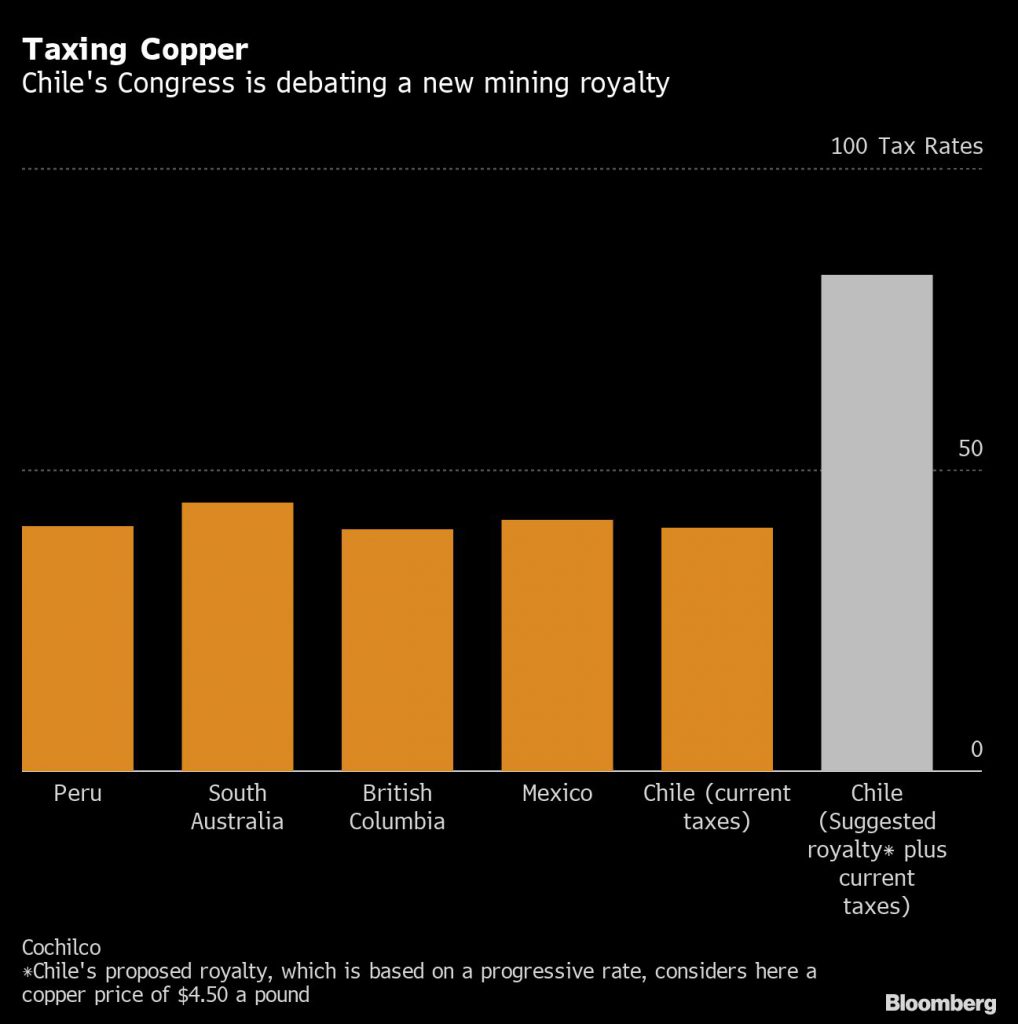Chile’s 75% copper tax closer to becoming reality

Chile’s lower house approved a progressive rate on copper sales in what could become one of the heaviest tax burdens in global mining, potentially stalling investments and boosting prices.
Lawmakers, who had already approved a bill to introduce a flat 3% on sales of both copper and lithium, on Thursday voted 78 to 55 to add a mechanism of marginal rates as copper prices rise, with the highest bracket set at 75%.
In doing so, the world’s biggest copper industry now moves closer to what the local mining society describes as an “almost expropriatory” system. Its proponents, including Communist Party representative Daniel Nunez, said the new mechanism would reap $7 billion a year at a time when Chile is looking to resolve lingering inequalities. Opposed by the government, the bill now goes to senate.
“It’s imperative that we recover economic returns for the people of Chile via mining royalties rather than continuing to gift private transnational companies,” opposition lawmaker Giorgio Jackson said before the vote.

Copper futures have rallied to the highest levels since the last supercycle a decade ago, benefiting from a recovering global economy and the clean-energy transformation. Surging prices have prompted politicians in some host nations to seek a bigger share of the windfall to fight poverty. For producers, the blow from steeper taxes may be partly offset by even higher prices as an investment slowdown inhibits their ability to meet future demand.
In Chile, the modification adds marginal rates starting at 15% on sales derived from copper prices of between $2 and $2.50 a pound and as much as 75% when prices exceed $4. At current levels, the effective rate would be 21.5%, although miners could discount refining costs. Representatives voted for Albemarle Corp. and Soc. Quimica & Minera de Chile SA to continue paying as much as 40% on lithium sales from the Atacama salt flat.
“It’s imperative that we recover economic returns for the people of Chile via mining royalties rather than continuing to gift private transnational companies”
Opposition lawmaker Giorgio Jackson
The government has estimated that the total tax burden for large miners would exceed 80%. Some opposition lawmakers have said the new system would replace an existing tax, meaning the total burden would be more like 50%. That would still be higher than other major copper-producing countries.
Chilean mines run by companies including BHP Group and state-controlled Codelco account for 28% of global copper. But many large operations are mature, requiring heavy investments to maintain output levels.
“This would at the very least delay any new capacity, extending the lengthy time-line to bring on a new mine,” said Grant Sporre, an analyst at Bloomberg Intelligence. “Chile’s output could start to fade.”
The government has indicated it could seek to block its passage via the Constitutional Court given it was introduced by the opposition. The new system wouldn’t be introduced until 2024 after lawmakers voted to respect companies’ stability agreements that expire in 2023.
Both company and government representatives in Chile want the existing sliding tax on profit, rather than sales, to be given a chance to operate at high prices of $4-plus a pound.

Related read: Copper price hits all-time high in New York as bulls stampede
The initial royalty proposal, introduced in 2018 by opposition lawmakers, has gained momentum amid rallying metal prices and surging profits. It would fund regional development projects, responding to the rising social and environmental standards of investors and supply chains.
Countries around the world are also looking at new revenue sources to help citizens recover from the pandemic. In Chile, efforts to feed state coffers are being intensified by a process to draft a new constitution after a spate of protests over social and economic inequalities in the months before the pandemic. Lawmakers have passed bills to allow Chileans to tap part of pension savings and are proposing a levy on the super rich and a minimum wage increase.
“This is part of the array of bills intended to create and exacerbate hate among Chileans,” Luciano Cruz-Coke, a government-aligned lawmaker, said before the vote. “We won’t indulge the left by handing over copper to bad public policy and killing the country’s main source of income.”
(By James Attwood and Valentina Fuentes, with assistance from Tom Azzopardi)
{{ commodity.name }}
{{ post.title }}
{{ post.date }}




Comments
Guillermo
Rich people crying……. A lot of BS in this article….